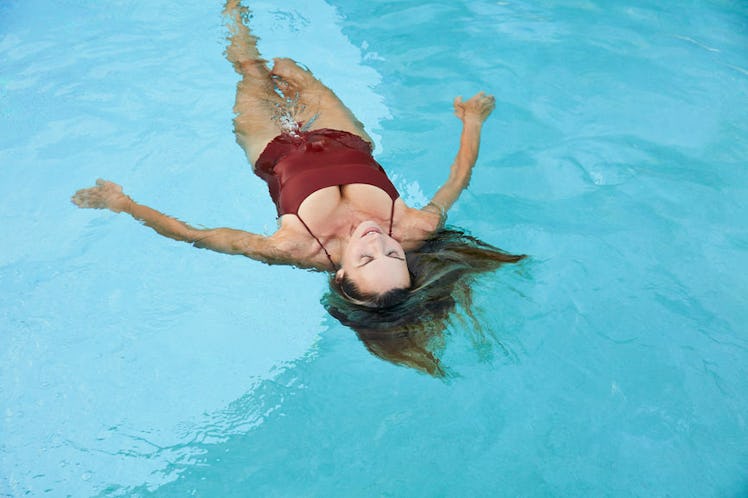
If You're Awful At Making Decisions, This One Trick Might Just Change Your Life
Raise your hand if you're the most indecisive human to walk the planet. I mean, personally, I stopped typing for a moment just so I could emphatically raise my hand, so I'm right there with you, friend. It's a good thing meditation can help you make decisions, because honestly, if I didn't practice it myself on a regular basis, I probably wouldn't be able to make up my mind about anything, whether it's the color of a dress I want to buy, or even something as important as how I structure my daily to-dos.
Meditation is huge in the world of wellness right now, but there's a pretty decent amount of legit evidence to back up a lot of the benefits associated with the practice. For instance, research from the UCLA Laboratory of Neuro Imaging has shown that meditation really does strengthen the brain and improve your ability to think clearly, which in turn can help you make decisions more efficiently.
According to the study's press release, researchers from UCLA conducted brain scans on 50 meditators (28 men and 22 women) and compared those findings to brain scans they took of 50 people who don't meditate. The results are a bit complicated to understand, but basically, the research found that people who consistently and regularly meditate experience measurable and real changes in their brain structure, and those changes translate to better thinking skills, and yes, better decision-making, too.
So what exactly do meditation experts think about this? Well, according to Veronica Parker, a kundalini yoga teacher and meditation coach, when it comes to making decisions, she believes practicing mindfulness can empower you to clear and calm your mind. "By releasing inner chatter, your mind can become clearer with more focus for the decisions at hand," she tells Elite Daily over email.
In addition to quieting your thoughts and mellowing out your overall mindset, Parker says meditation also allows you to let go of your inner ego, as well as your inner critic — "you know, that little voice inside making you second-guess yourself," the expert explains, adding that it can almost paralyze you at times, making it impossible to really stick to and confidently follow through with a decision, even if it's as minor as what to eat for lunch.
Basically, meditation can help you feel more confident when you're making decisions, Parker says, and it'll help to silence that little voice inside of you that's filling you with self-doubt. "Dissolving self-doubt is one of the best benefits of a consistent meditation practice," she tells Elite Daily. "In this way, you get to trust yourself and the important decisions you are making in your life."
The key, though, is to keep up with your meditation practice. In other words, you can't just meditate once and expect all of your decisions thereafter to be easy-peasy. The only way to reap these mindfulness benefits is to show up for yourself and put what you've learned into practice.
Of course, there are tons of different ways to meditate, and no one method is right or wrong; it's all about finding what works for you. But, if you're having trouble figuring out where to start, Susan Shumsky, a yoga teacher and author of the book Awaken Your Divine Intuition, tells Elite Daily that one of her personal favorite meditation methods for decision-making relies on developing a strong sense of intuition.
Here's how it's done, according to Shumsky: Start by sitting down in a chair and closing your eyes. Take several deep breaths; breathe deeply and slowly, in through your nose and out through your mouth. With each deep breath, Shumsky tells Elite Daily over email, imagine you’re going deeper and deeper into a state of relaxation. "Each time you breathe out, imagine you're letting go and blowing out all stress and anxiety," she explains.
After about five of these deep breaths, Shumsky says you should begin to feel much more at-ease, centered, and balanced. Once you feel like you've reached that point, the meditation coach says you can continue by breathing normally, in whatever way feels comfortable for you.
But you're not done yet, my friend. According to Shumsky, a great way to make the most of this meditative state is to ask a question — yes, seriously, ask yourself a question, out loud. "I recommend you state your question audibly or whisper it," Shumsky suggests. "Word your question like this: 'Is it highest wisdom for me to [insert situation here]?'" According to the meditation coach, whatever question you pose here can be answered by your "higher self." And, look, I know this all probably sounds a little over your head, but the idea here is to basically get into such a clearheaded state of mind through the practice of meditation, that you genuinely feel confident and sure of yourself when it comes time to make a decision about something, rather than clouded and confused by a barrage of conflicting thoughts and ideas. So, maybe the question you ask your "higher self" during meditation could be about which job opening you want to pursue more, or which of your dating app flings you seem to vibe with the most.
After pondering your question for a bit, Shumsky says you should take another big, deep breath, and do what she calls the "do-nothing program" — hello, yes, I am listening. But really, what that means, according to Shumsky, is doing as little as possible, and having absolutely no expectations regarding the answer to the question you asked. In other words, just completely let go and have a neutral and receptive attitude. Don’t try to get an answer; rather, the meditation coach says, let the answer come to you.
"The answer will occur to you as a visual impression, as words (auditory), or as a gut feeling (kinesthetic)," Shumsky explains. "Ask, and you will receive."